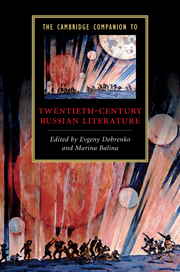Book contents
- Frontmatter
- 1 Poetry of the Silver Age
- 2 Prose between Symbolism and Realism
- 3 Poetry of the Revolution
- 4 Prose of the Revolution
- 5 Utopia and the Novel after the Revolution
- 6 Socialist Realism
- 7 Poetry after 1930
- 8 Russian Epic Novels of the Soviet Period
- 9 Prose after Stalin
- 10 Post-Soviet Literature between Realism and Postmodernism
- 11 Exile and Russian Literature
- 12 Drama and Theatre
- 13 Literature and Film
- 14 Literary Policies and Institutions
- 15 Russian Critical Theory
- Index
15 - Russian Critical Theory
Published online by Cambridge University Press: 28 May 2011
- Frontmatter
- 1 Poetry of the Silver Age
- 2 Prose between Symbolism and Realism
- 3 Poetry of the Revolution
- 4 Prose of the Revolution
- 5 Utopia and the Novel after the Revolution
- 6 Socialist Realism
- 7 Poetry after 1930
- 8 Russian Epic Novels of the Soviet Period
- 9 Prose after Stalin
- 10 Post-Soviet Literature between Realism and Postmodernism
- 11 Exile and Russian Literature
- 12 Drama and Theatre
- 13 Literature and Film
- 14 Literary Policies and Institutions
- 15 Russian Critical Theory
- Index
Summary
There is a curious shape to twentieth-century Russian writing on literary creativity. It swings between a bold revolutionary modernism – materialistic, mechanistic, impersonal, poised to dissolve the bourgeois subject together with the socioeconomic class that nourished it – and a naive idealism relying on archaic categories of spiritual epiphany and unconditional emotional commitment. From 1934 until well into the 1960s, the spiritual extreme dominated the USSR’s official theory of art: although deeply conservative and faith-based, the doctrine of Socialist Realism played a radical role in the pragmatic modernization of the Stalinist–Soviet state. As that state decayed and finally collapsed in the late 1980s, the Soviet Union at last ‘caught up with and surpassed’ the West – at least on the artistic front. With some justification, although also with that hint of cultural supremacy so congenial to Russian critical thought, the émigré theorist Mikhail Epstein claimed that postmodernism itself was born in Russia during the Brezhnev Stagnation. Not in French academies but in shabby post-Stalinist space, strewn with the (literal) ruins of the Socialist Realist fantasy, did all truth claims become preposterous, all mega-narratives lead nowhere, all speaking subjects (and all objects spoken of) become mere simulacra, and all explanatory systems begin to feel faked. If symbolism in search of a mystical totality accommodated itself to revolutionary modernism in the 1920s, then the closing years of the century in Russia were positively postmodern in their cynical sophistication at manipulating the clich´e and fragment.
- Type
- Chapter
- Information
- The Cambridge Companion to Twentieth-Century Russian Literature , pp. 269 - 288Publisher: Cambridge University PressPrint publication year: 2011



